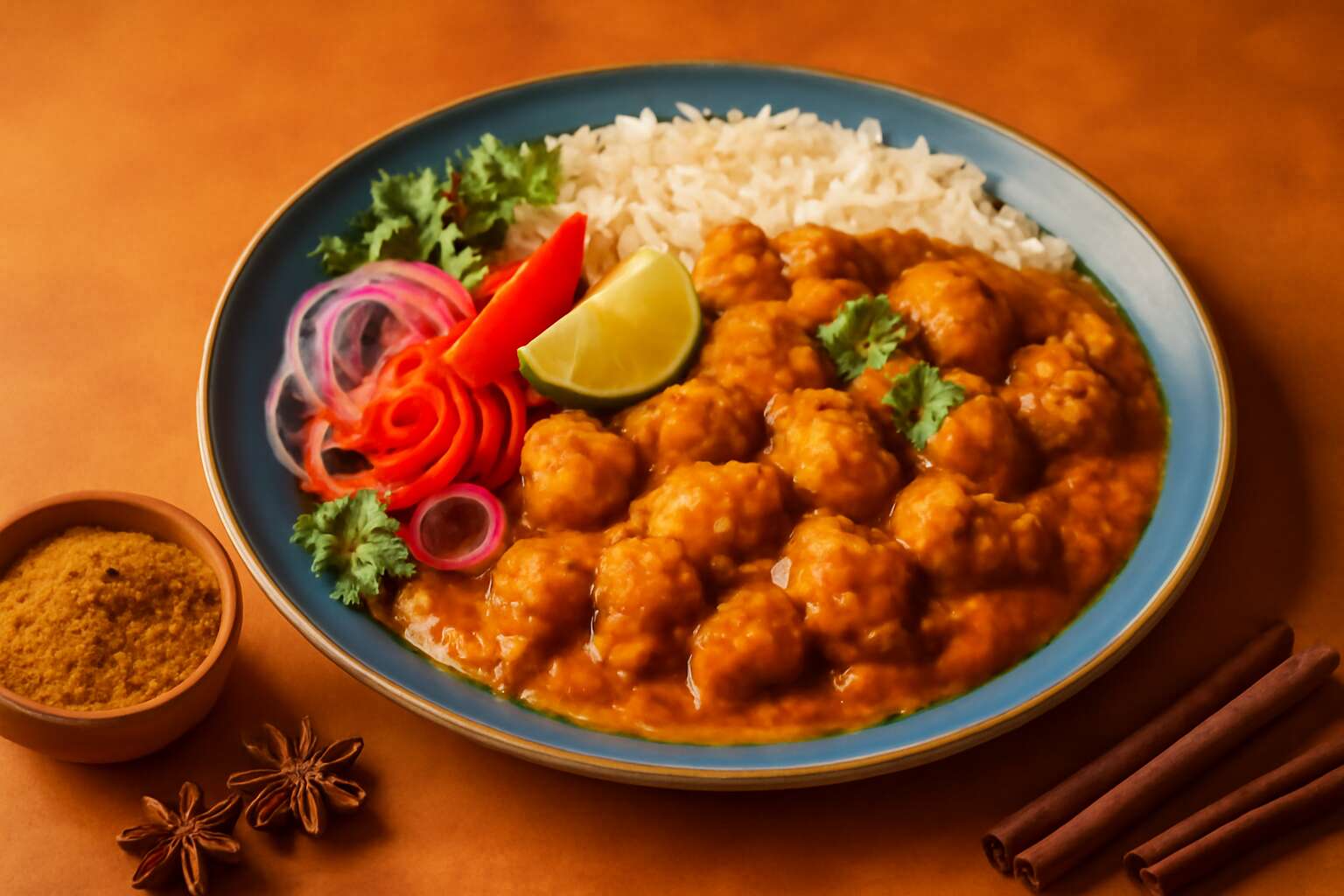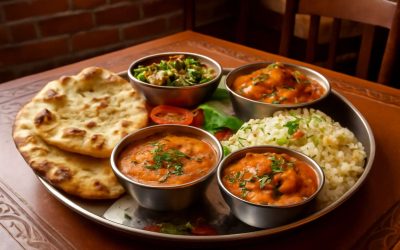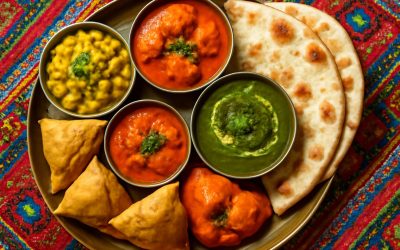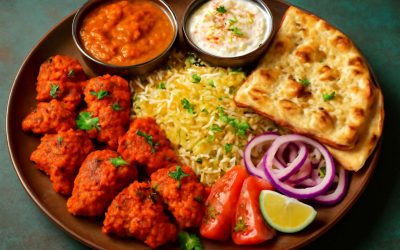Understanding Indian Cuisine and Its Popular Ingredients
Overview of Indian Spices and Herbs – Common spices like turmeric, cumin, coriander, and cardamom and their effects
Indian cuisine is a symphony of bold flavors, rich aromas, and intricate spice combinations. It’s no surprise that many South Africans find themselves craving a comforting, satiating meal, only to feel unexpectedly sleepy afterward. But what is it about Indian food that makes me sleepy? The secret lies in its popular ingredients — especially the spices and herbs that not only elevate flavor but also influence our body’s response.
Spices like turmeric, cumin, coriander, and cardamom are staples in Indian cooking. Turmeric, with its potent anti-inflammatory properties, also has a calming effect on the nervous system. Cumin and coriander, meanwhile, aid digestion, which can lead to a feeling of relaxation and drowsiness after a hearty meal. Cardamom, often used in desserts, has mild sedative qualities that can lull the body into a restful state, explaining why Indian food makes me sleepy after a satisfying feast.
Typical Ingredients in Indian Dishes – Rice, lentils, dairy, and vegetables that contribute to the meal’s composition
Indian cuisine is a vibrant tapestry woven from a diverse array of ingredients that create its signature richness and depth. Central to these dishes are staple ingredients like rice, lentils, dairy, and an assortment of vegetables, each bringing a unique character to the meal. These elements not only form the foundation of many Indian recipes but also play a subtle role in influencing how you feel after dining.
For example, fluffy basmati rice acts as a comforting base, while lentils such as dal deliver protein and fiber, aiding digestion and contributing to that warm, satiated feeling. Dairy products like yogurt and paneer enhance the creaminess of curries and add a cooling contrast to the spices. Vegetables like spinach, tomatoes, and eggplant are seasoned with aromatic herbs, creating a symphony of flavors that can relax the body and mind.
In fact, when pondering why Indian food makes me sleepy, it’s essential to recognize the complex interplay of these ingredients. Their combined effects on digestion and sensory stimulation can lull you into a peaceful, drowsy state, especially after a hearty, spice-laden meal.
The Science Behind Food-Induced Sleepiness
How Certain Foods Affect the Body – Impact on hormones, neurotransmitters, and digestion
There’s an almost hypnotic quality to the way certain Indian dishes lull the senses—perhaps a testament to the intricate dance of biology and tradition. When pondering why Indian food makes me sleepy, it’s impossible to ignore the profound impact food has on our hormones and neurotransmitters. The rich carbohydrates from rice and lentils trigger a surge in insulin, which facilitates the uptake of amino acids like tryptophan in the brain. Once there, tryptophan converts into serotonin and melatonin—key players in regulating sleep cycles. This biochemical cascade is often the silent architect behind post-meal drowsiness.
Moreover, the spices that define Indian cuisine, such as turmeric and cumin, influence digestion and hormonal responses in subtle yet powerful ways. The process of digestion itself demands increased blood flow to the gastrointestinal tract, which can divert resources from alertness to processing the meal. This physiological shift often results in that familiar sensation of sleepiness. For some, the emotional comfort and mental relaxation provided by the familiar flavors can deepen this effect, creating a perfect storm for slumber. It’s not merely the ingredients, but the body’s response to them, that makes why Indian food makes me sleepy a deeply personal and biological phenomenon.
Role of Tryptophan and Serotonin – The amino acids in Indian foods that promote relaxation and sleep
There’s a fascinating biochemical narrative behind why Indian food makes me sleepy. Central to this story is tryptophan, an amino acid abundant in many Indian dishes, especially those featuring lentils, dairy, and rice. When consumed, these foods trigger an increase in insulin levels, which in turn facilitates the absorption of tryptophan into the brain. Once there, tryptophan transforms into serotonin, the neurotransmitter responsible for mood and relaxation. Serotonin often acts as a precursor to melatonin, the hormone that governs our sleep-wake cycle.
This chain reaction — from carbohydrate-rich foods to sleep-inducing neurotransmitters — explains the soothing, almost hypnotic effect of Indian cuisine. The complex interplay of amino acids, hormones, and neurotransmitters underscores why Indian food makes me sleepy. It’s as if the meal’s intricate flavors are quietly orchestrating a biological lullaby, inviting the body to relax and unwind.
Common Indian Dishes That May Cause Sleepiness
Hearty Lentil and Rice Meals – Dishes like dal and biryani and their influence on drowsiness
There’s a certain enchantment in the aroma of hearty Indian dishes—an allure that beckons both the senses and the soul. Among these, lentil and rice-based meals like dal and biryani stand out, not just for their vibrant flavors but also for their surprising ability to induce a gentle wave of drowsiness. It’s as if these dishes carry a lullaby woven into their very fibers, whispering relaxation into the mind.
This phenomenon is no coincidence. The combination of complex carbohydrates and plant-based proteins in dal and biryani causes a surge in serotonin production, which naturally promotes sleepiness. Additionally, the slow-release nature of lentils and rice ensures a sustained energy flow that gently tapers off, inviting rest. For many, the comforting warmth of these foods acts as a soothing balm, making it easy to drift into a restful state after indulging in such traditional fare.
Creamy Curries and Rich Sauces – Impact of dairy, coconut milk, and ghee-laden curries
When it comes to why Indian food makes me sleepy, few dishes are as notorious as the creamy curries and rich sauces that grace every Indian table. These dishes, often laden with dairy, coconut milk, and generous amounts of ghee, possess a hypnotic power over our alertness. It’s as if each spoonful whispers a lullaby, coaxing the mind into relaxation.
The secret lies in the ingredients themselves. Dairy products like cream and butter are rich sources of tryptophan, an amino acid known to boost serotonin levels—our body’s natural sleep hormone. Coconut milk, with its soothing fats, further amplifies this calming effect, creating a cozy, almost soporific ambiance in every bite. The dense, velvety sauces coat the palate and body, making it difficult to resist the siren call of rest.
- Ghee-laden curries
- Coconut-based sauces
- Creamy paneer dishes
All these elements, combined with the warm spices that characterize Indian cuisine, form a potent recipe for drowsiness. It’s no wonder many South Africans find themselves succumbing to a well-deserved siesta after enjoying such indulgent and comforting Indian dishes—truly a testament to why Indian food makes me sleepy!
Spicy but Relaxing Combinations – How spice combinations can induce fatigue
Indian cuisine is renowned for its vibrant flavors and aromatic spice blends, but many South Africans notice an unexpected side effect—feeling incredibly sleepy after a hearty meal. This phenomenon is often linked to specific spice combinations that, while tantalizing, can also induce a sense of relaxation or fatigue. The complex interplay of spices like cumin, turmeric, and coriander creates a warming, almost hypnotic effect that can lull the body into a restful state.
Particularly, dishes that feature a harmonious balance of spices—such as a mildly spicy chicken curry or a fragrant vegetable biryani—tend to amplify this drowsiness. The spicing often includes ingredients like cinnamon, cloves, and cardamom, which are not only flavor enhancers but also possess calming properties. These spices work together to influence neurotransmitters and hormonal responses, further explaining why Indian food makes me sleepy.
Some of the most common Indian dishes that may cause sleepiness include:
- Spicy but soothing chicken tikka masala
- Rich vegetable korma with a hint of cinnamon
- Hearty lentil dal with turmeric and cumin
It’s the combination of warmth, spice, and the body’s natural response to these ingredients that can make even the most energetic feel the gentle pull toward rest. Whether it’s the subtle heat of a spicy curry or the comforting aroma of a slow-cooked biryani, Indian food’s unique blend of flavors often leaves many in South Africa wondering—why Indian food makes me sleepy?
Impact of Portion Sizes and Eating Habits
Large, Carb-Heavy Meals – How heavy meals contribute to post-meal drowsiness
There’s an almost hypnotic quality to the way Indian food weaves its magic—rich, aromatic, and undeniably satisfying. But many wonder, why Indian food makes me sleepy? The answer lies not only in the spices but also in the way we indulge in large, carb-heavy meals that tip the scales of energy and exhaustion. When plates brim with fragrant rice, lentils, and creamy curries, the body shifts into a different rhythm, prioritizing digestion over alertness.
Heavy meals, especially those abundant in carbohydrates, stimulate a surge in insulin, which increases the availability of tryptophan—a precursor to serotonin and melatonin. This biochemical cascade fosters a sense of calm and drowsiness, making you feel as if you’re drifting into a warm, comforting haze. In Indian cuisine, where rice and lentils dominate, the sheer volume of food can overwhelm the digestive system, redirecting blood flow and energy inward. This natural response often leaves us pondering, why Indian food makes me sleepy, and the answer is intricately woven into the meal’s composition and portion size.
Eating Frequency and Timing – The effect of meal timing on sleepiness after Indian food
In the lush tapestry of Indian culinary traditions, the timing of meals plays an understated yet pivotal role in influencing post-dinner drowsiness. When indulging in a hearty Indian feast, the hour at which you consume your meal can transform your experience from vibrant to lethargic. Eating late at night, especially after a day of bustling activity, often amplifies the feeling of sleepiness. This is because the body’s natural circadian rhythm signals a descent into rest mode, and a substantial Indian meal can accelerate this transition, leaving many pondering, why Indian food makes me sleepy.
The frequency of meals also subtly impacts this phenomenon. Regular, moderate eating patterns help regulate blood sugar levels, preventing abrupt spikes and crashes that can intensify fatigue. Conversely, irregular or overly large servings—common in festive Indian feasts—overload the digestive system, redirecting blood flow inward and encouraging drowsiness. This intricate dance between meal timing, portion size, and digestion orchestrates the sleepy aftermath that many experience after relishing Indian dishes.
- Consuming large, carb-heavy portions during dinner, especially late in the evening, tends to amplify sleepiness.
- Eating frequently throughout the day can mitigate the intensity of post-meal fatigue, maintaining more stable energy levels.
- Timing meals at least a few hours before sleep allows digestion to progress comfortably, reducing the likelihood of waking up sluggish.
These eating habits weave seamlessly into the overall narrative of why Indian food makes me sleepy. The harmonious blend of portion sizes and meal timing creates a symphony that guides your body toward a peaceful, drowsy state—an experience as inevitable as the setting sun over the Indian plains. Recognizing how these factors influence your body’s response transforms the way you approach Indian cuisine, turning a simple meal into a mindful ritual that respects your natural rhythms.
Cultural and Personal Factors Influencing Sleepiness
Tradition of Heavy, Comfort Foods – Cultural eating habits that promote relaxation after meals
Indian cuisine is renowned for its rich, comforting flavors that often evoke a sense of warmth and contentment. For many, enjoying a hearty Indian meal feels like a ritual of relaxation—an experience that gently lulls the body into a state of calm. This cultural tradition of heavy, comfort foods isn’t just about satisfying the palate; it’s deeply rooted in communal and personal habits that promote rest after a fulfilling meal.
In South Africa and beyond, the act of eating a substantial Indian dish often signifies more than nourishment—it’s a moment of unwinding. The combination of flavors, textures, and ingredients, such as rice, lentils, and dairy, creates a meal that naturally encourages sleepiness. The cultural preference for hearty, carb-heavy meals fosters a post-meal tranquility, making it clear why Indian food makes me sleepy. The soothing effect of these dishes, intertwined with tradition, ensures that after a satisfying plate, relaxation naturally follows.
Individual Digestive Responses – Personal differences in digestion that affect sleepiness
Every person’s digestive system responds uniquely to the diverse array of ingredients found in Indian cuisine. While some relish the spicy complexity and aromatic herbs, others find themselves succumbing to unexpected fatigue after a hearty meal. This variability is rooted in individual differences—factors such as metabolic rate, gut microbiota, and even genetic makeup all influence how the body processes Indian dishes. For example, some individuals may experience heightened relaxation due to slower digestion, while others remain alert despite consuming similar foods.
Moreover, personal eating habits and meal timing significantly shape post-meal sleepiness. Those who regularly indulge in large, carb-heavy Indian meals tend to feel more drowsy, as their bodies prioritize digestion and energy redistribution. The body’s release of hormones like insulin and serotonin, stimulated by specific ingredients, further amplifies this effect. It’s fascinating how the same dish can produce such different responses, making it clear why Indian food makes me sleepy—personal digestive responses play a crucial role in this phenomenon.
Health Conditions and Lifestyle Factors
Food Sensitivities and Allergies – How sensitivities to specific ingredients may influence tiredness
Many people find themselves lulled into a peaceful slumber after indulging in a hearty Indian feast. But what is it about Indian food that makes me sleepy? One compelling factor lies in individual health conditions and lifestyle factors. For some, sensitivities to specific ingredients, such as dairy or certain spices, can trigger fatigue. Food sensitivities may lead to a sluggish digestive process, causing the body to divert energy towards processing these ingredients, leaving you feeling drowsy.
Moreover, lifestyle factors like eating large, carb-heavy meals or consuming rich, creamy curries can intensify this sleepy feeling. The body’s response to heavy meals involves increased insulin production, which may boost serotonin and melatonin levels—hormones intimately linked to sleep. These biochemical shifts make it no surprise that many wonder why Indian food makes me sleepy, especially when combined with personal digestive responses and sensitivities.
Lifestyle Factors – Sleep patterns, stress, and overall health impacting post-eating fatigue
There’s an almost hypnotic allure to Indian cuisine, a tapestry woven with aromatic spices and rich ingredients that beckon us into a world of sensory indulgence. Yet, many find themselves succumbing to an unexpected lull—the irresistible wave of sleepiness that follows a hearty Indian meal. The question echoes in countless minds: why Indian food makes me sleepy? It’s a phenomenon rooted not only in the complexity of the dishes but also in the delicate interplay of our body’s internal rhythms and external habits.
Our lifestyle factors wield a profound influence on this post-meal drowsiness. For instance, consuming large, carb-heavy Indian meals—laden with rice, lentils, and creamy curries—can cause a significant spike in insulin levels. This biochemical response often leads to increased production of serotonin and melatonin, hormones that regulate sleep and relaxation. Moreover, stress levels and irregular sleep patterns compound this effect, making the body more prone to fatigue after a substantial feast. It’s no wonder that in South African households, where vibrant Indian flavours are a beloved tradition, this natural inclination toward relaxation is both celebrated and understood.
- Eating late at night disrupts natural circadian rhythms, amplifying feelings of tiredness after enjoying Indian dishes.
- High-stress days paired with indulgent food intensify the body’s fatigue signals, making us crave rest.
- Overall health and digestive efficiency determine how quickly we process and respond to the meal, influencing the degree of sleepiness experienced.
In essence, the gentle descent into sleep after Indian food isn’t merely about the meal itself but about a symphony of lifestyle factors—each note contributing to the lull. When combined with the comforting, often heavy nature of traditional Indian cuisine, it’s no wonder many ask, “why Indian food makes me sleepy?” The answer lies in the intricate dance of biochemistry, personal health, and cultural eating practices—an enduring testament to the power of food to nurture not just our bodies, but also our innate need for rest and renewal.
Tips to Enjoy Indian Food Without Excessive Sleepiness
Meal Portion Control – Managing serving sizes for better alertness
In the shadowy realm of culinary mysteries, few questions linger as hauntingly as “why Indian food makes me sleepy.” The answer lies not solely in the spices or ingredients but in the delicate balance of portion control. Overindulgence in hearty lentil dishes or rich curries can unearth a wave of sluggishness that envelops the senses like a dark fog.
Managing serving sizes becomes an art—an act of restraint that preserves the soul’s alertness amid the comforting embrace of Indian cuisine. By controlling meal portions, one can tame the natural tendency for post-meal drowsiness. Small, measured servings of fragrant rice, tender dals, and aromatic vegetables reduce the burden on digestion, allowing the body to remain vigilant rather than succumbing to fatigue.
- Opt for smaller servings of creamy curries laden with ghee and coconut milk.
- Pair spicy dishes with lighter accompaniments to balance the meal’s heaviness.
- Eat slowly, savoring each bite, giving your digestion time to adapt without overwhelming your senses.
In this dance of flavors and textures, understanding the subtle power of meal portion control can turn a sleepy ordeal into a symphony of alertness, even amid the intoxicating allure of Indian spices that whisper secrets of relaxation and repose.
Balancing Spices and Ingredients – Choosing lighter options and balanced meals
Indian cuisine, with its intoxicating blend of spices and rich ingredients, often leaves many pondering, “why indian food makes me sleepy.” The answer doesn’t merely lie in the aromatic spices but also in the delicate balance of ingredients and portion sizes. When portions are generous and meals are heavy, the body shifts its focus to digestion, often at the expense of alertness. This post-meal sluggishness can seem almost supernatural—an enchanting lullaby sung by ghee-laden curries and carb-heavy dishes.
To enjoy Indian food without succumbing to excessive sleepiness, it’s wise to select lighter options that still carry the essence of tradition. Incorporating a variety of vegetables, lean proteins, and modest servings of rice can help maintain vitality. Consider pairing spicy dishes with lighter accompaniments like fresh salads or tangy chutneys to balance the meal’s heaviness. Eating slowly and mindfully not only heightens the sensory experience but also grants your digestive system the grace to work without overwhelming your senses.
Strategically, opting for less creamy curries and moderating the amount of ghee or coconut milk can make a significant difference. Here’s a simple approach:
- Choose dishes with a higher vegetable content, which are naturally lighter and easier to digest.
- Limit portion sizes of rich, fatty curries that contain generous amounts of dairy or coconut milk.
- Pair hearty lentils with lighter grains or vegetables for a balanced yet invigorating meal.
By understanding **why indian food makes me sleepy** and adjusting your approach accordingly, you can indulge in the vibrant tapestry of Indian flavors while keeping your alertness intact. The secret lies in moderation, mindful eating, and a touch of culinary restraint—turning what could be a lull into a lively dance of flavors and sensations.
Timing Your Meals – Optimal times to eat Indian dishes to avoid sleepiness
Many of us have experienced that familiar wave of drowsiness after a hearty Indian meal. But have you ever wondered why Indian food makes me sleepy? It’s not just the aromatic spices or the comforting warmth of a lentil dal; it’s also about timing. Eating late at night or after a long day can amplify the effects of post-meal fatigue, making you feel sluggish and ready for bed. Conversely, enjoying Indian dishes during the daytime, when your body is naturally more alert, can help mitigate that overwhelming desire to nap.
Timing your meals strategically can make a noticeable difference. Opt for lunch or early afternoon meals to enjoy the rich flavors without the unwanted sleepiness. If you must indulge in Indian food in the evening, consider lighter options that are easier to digest, like vegetable-based curries or grilled lean proteins. This way, you preserve the vibrant taste while maintaining your energy levels. Remember, the key lies in listening to your body’s natural rhythms and choosing the right moment to savor those delightful spices!




0 Comments